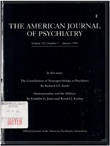Personality disorder in patients infected with HIV: a controlled study with implications for clinical care
Abstract
OBJECTIVE: Previous studies of psychiatric illness in populations infected with or at risk for HIV have not included systematic evaluation for personality disorders. The authors present the first controlled study of 1) personality disorders in HIV-positive and HIV- negative homosexual men and 2) the impact of personality disorder on coping, social support, and mood in asymptomatic HIV-positive homosexual men. METHOD: The authors studied 58 asymptomatic HIV- positive and 53 HIV-negative homosexual men living outside the high- prevalence epicenters of the AIDS epidemic. Personality disorder was assessed with a clinician-administered interview, the Structured Clinical Interview for DSM-III-R. RESULTS: There was a significantly higher prevalence of personality disorder in the HIV-positive (33%) than in the HIV-negative (15%) subjects. In the HIV-positive subjects, those with a personality disorder (compared to those without a personality disorder) showed 1) significantly greater mood disturbance, with higher scores on the Hamilton Rating Scale for Depression, Hamilton Rating Scale for Anxiety, Profile of Mood States Total Mood Dysfunction, and the Beck Hopelessness Scale, 2) greater use of denial and helplessness when coping with the threat of AIDS, and 3) greater social conflict. CONCLUSIONS: These findings suggest that personality disorder is common in the HIV-positive population. Compared with HIV- infected patients without a personality disorder, patients with a personality disorder may experience greater dysphoria and be more likely to cope with the threat of AIDS in a dysfunctional way. Recognition of the impact of personality disorder on coping with HIV infection is important for comprehensive, sensitive, and effective clinical care.
Access content
To read the fulltext, please use one of the options below to sign in or purchase access.- Personal login
- Institutional Login
- Sign in via OpenAthens
- Register for access
-
Please login/register if you wish to pair your device and check access availability.
Not a subscriber?
PsychiatryOnline subscription options offer access to the DSM-5 library, books, journals, CME, and patient resources. This all-in-one virtual library provides psychiatrists and mental health professionals with key resources for diagnosis, treatment, research, and professional development.
Need more help? PsychiatryOnline Customer Service may be reached by emailing [email protected] or by calling 800-368-5777 (in the U.S.) or 703-907-7322 (outside the U.S.).



